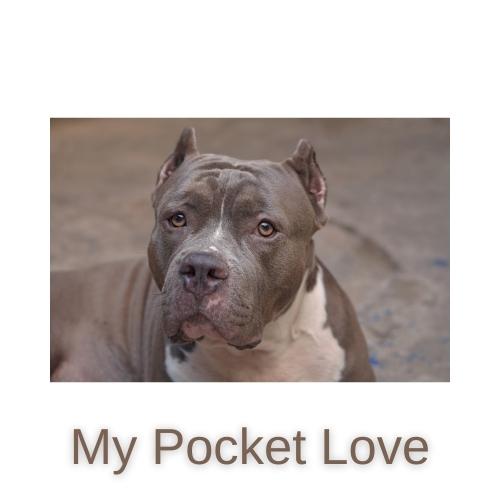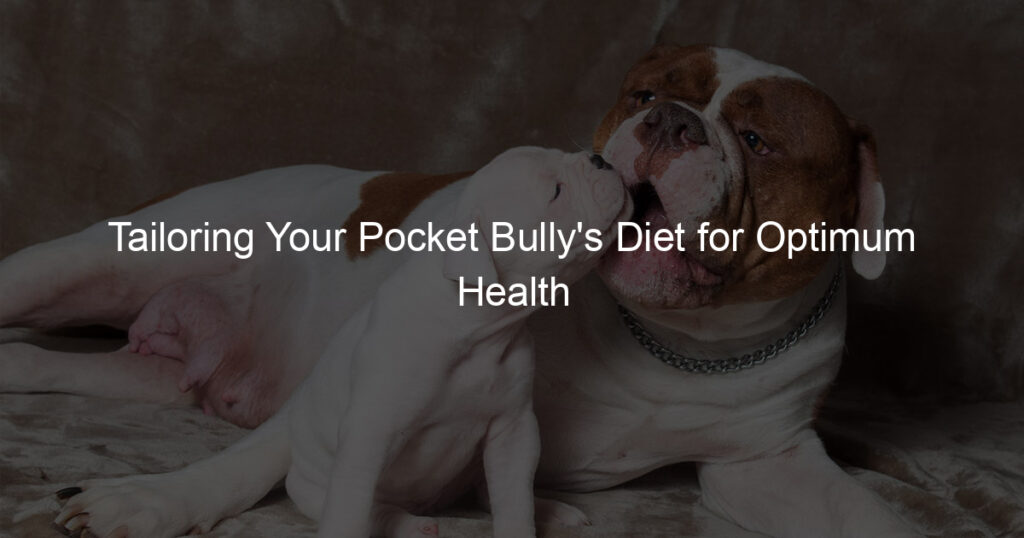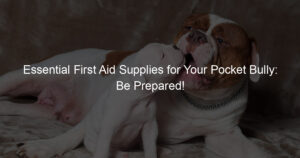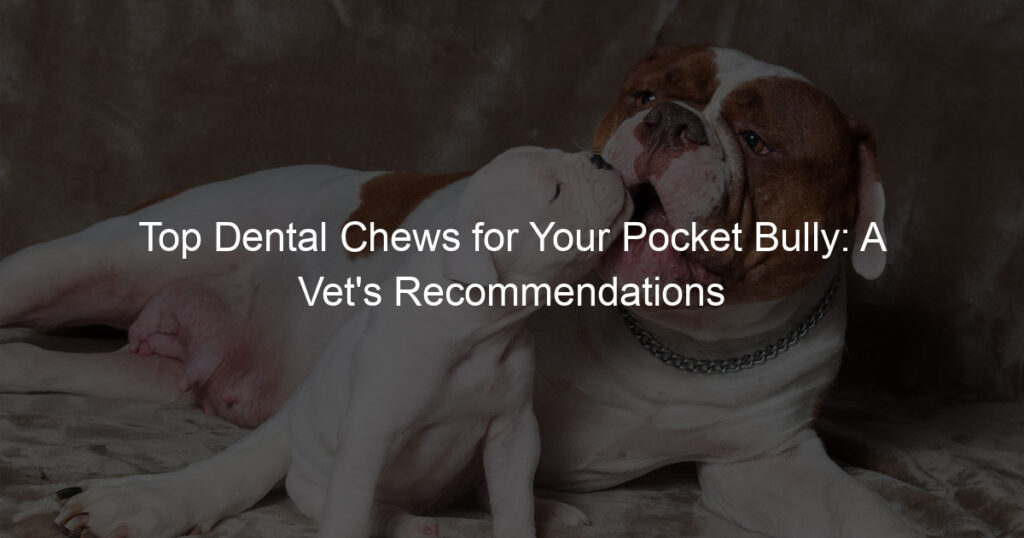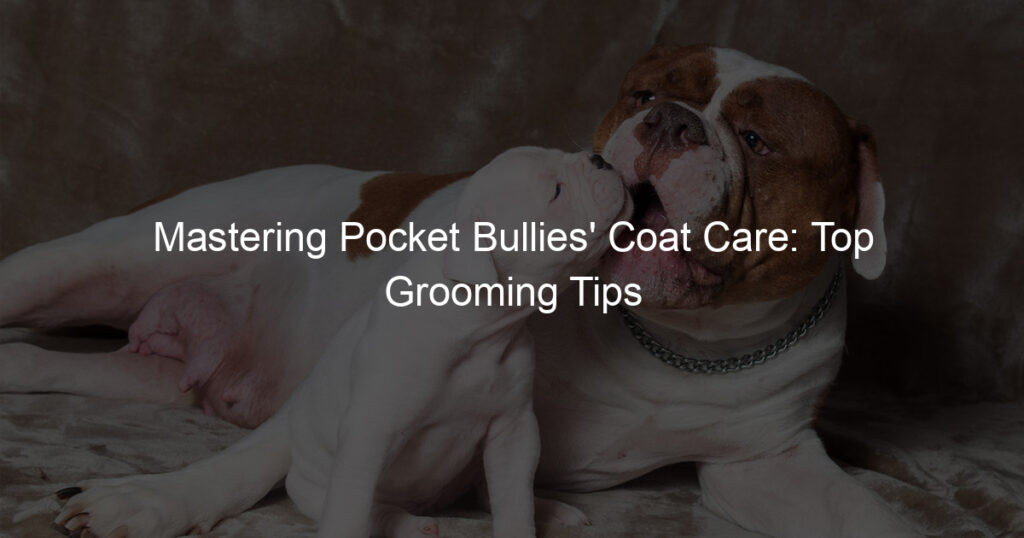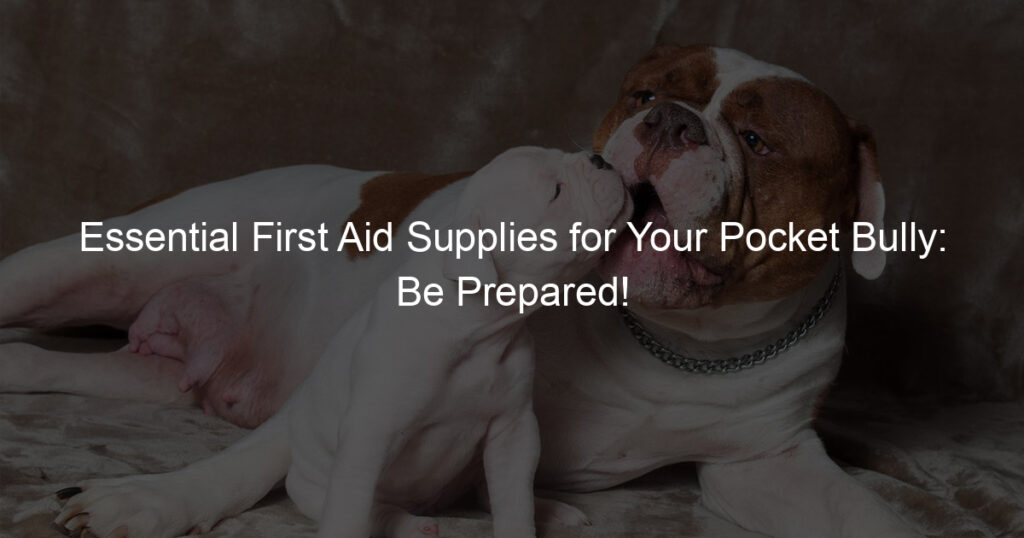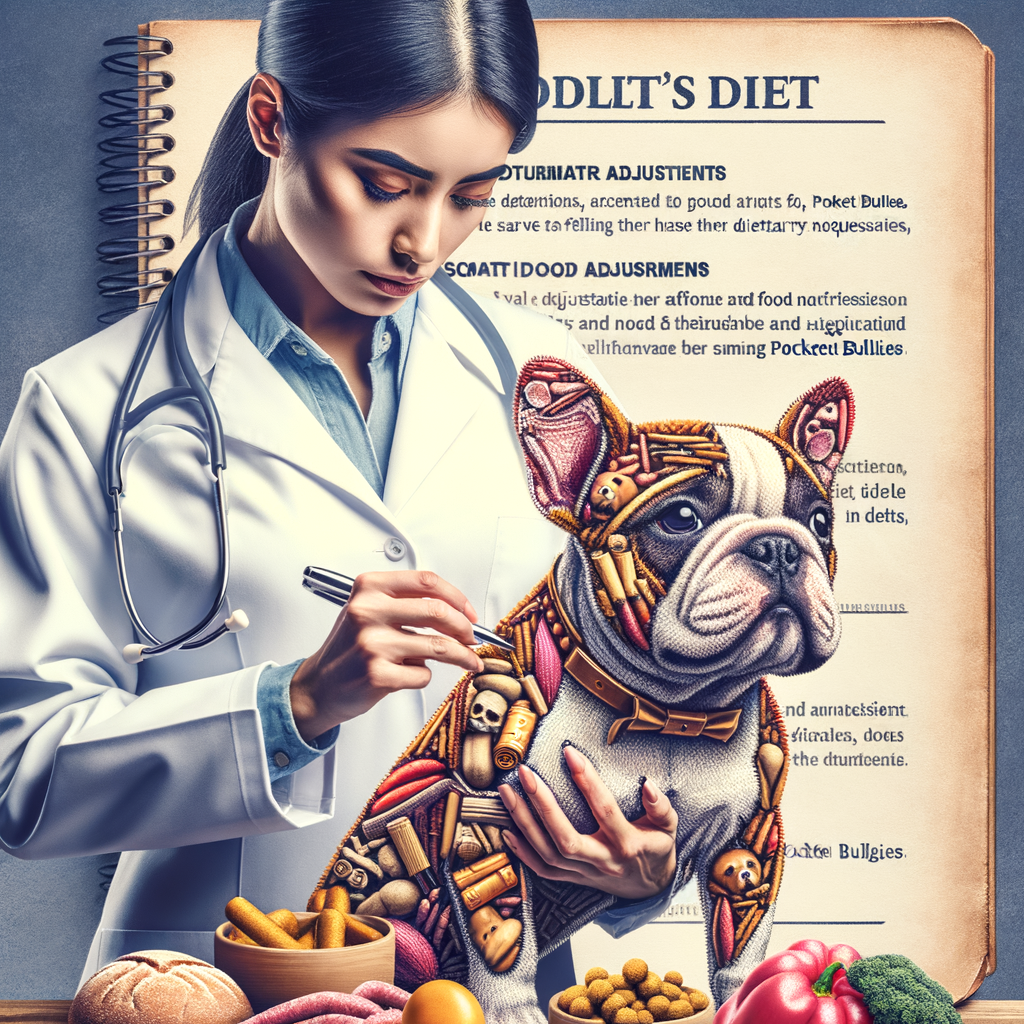
Introduction to Pocket Bullies Diet
When it comes to the health and well-being of your Pocket Bully, diet plays a crucial role. A well-balanced diet not only ensures that your Pocket Bully stays healthy and fit, but it also helps in their overall growth and development. In this section, we will delve into the importance of a balanced diet for your Pocket Bully and debunk some common misconceptions about their diet.
- Understanding the importance of a balanced diet
A balanced diet is essential for your Pocket Bully’s overall health. It provides the necessary nutrients that your pet needs to grow and thrive. These nutrients include proteins, carbohydrates, fats, vitamins, and minerals. Each of these nutrients plays a unique role in your Pocket Bully’s body. For instance, proteins help in muscle development, while carbohydrates provide energy. Fats are essential for skin and coat health, and vitamins and minerals are necessary for various bodily functions.
- Common misconceptions about Pocket Bullies diet
There are several misconceptions about the diet of Pocket Bullies. One common misconception is that they should be fed a high-protein diet. While proteins are essential for their growth and development, an excessively high-protein diet can lead to health problems such as kidney damage. Another misconception is that Pocket Bullies should be fed large quantities of food. However, overfeeding can lead to obesity and other health issues. It’s important to feed your Pocket Bully the right amount of food based on their age, size, and activity level.
In conclusion, understanding the importance of a balanced diet and debunking common misconceptions about your Pocket Bully’s diet can help you provide the best care for your pet. Remember, a healthy diet leads to a healthy and happy Pocket Bully.
Nutritional Needs of Pocket Bullies
Understanding the nutritional needs of your Pocket Bully is crucial to their health and well-being. One of the key components of their diet is protein. Let’s delve into the importance of protein and the best sources for it.
Protein Requirements
Protein is a vital part of a Pocket Bully’s diet. It plays a significant role in their growth, muscle development, and overall health.
- Importance of protein in a Pocket Bullies diet
- Best sources of protein for Pocket Bullies
Protein is the building block of your Pocket Bully’s body. It helps in the growth and repair of their muscles, skin, and other body tissues. It also aids in the production of antibodies that help fight infections. A diet rich in protein can help your Pocket Bully maintain a healthy weight and build strong muscles. According to a study, dogs require at least 18% of their diet to be protein, but for active breeds like Pocket Bullies, this percentage should be higher.
There are many excellent sources of protein for your Pocket Bully. These include chicken, beef, turkey, fish, and eggs. It’s important to choose high-quality, lean meats to ensure your Pocket Bully is getting the most nutritional value. Additionally, some vegetables like peas and lentils can also provide a good amount of protein. Always remember to balance the protein sources with other nutrients for a well-rounded diet.
In conclusion, protein is a vital part of your Pocket Bully’s diet. By understanding its importance and knowing the best sources, you can ensure your Pocket Bully is getting the nutrition they need for a healthy and active life.
Carbohydrate Requirements
Carbohydrates play an essential role in the diet of Pocket Bullies. They provide the energy needed for these active dogs to play, run, and maintain their overall health. Let’s delve deeper into the role of carbohydrates and the best sources for them in a Pocket Bullies diet.
- Role of carbohydrates in a Pocket Bullies diet
- Recommended carbohydrate sources for Pocket Bullies
Carbohydrates are a key source of energy for Pocket Bullies. They are broken down into glucose in the body, which fuels the dog’s activities. Without enough carbohydrates, your Pocket Bully may lack the energy it needs for daily activities. Moreover, certain types of carbohydrates, such as dietary fiber, aid in digestion and help maintain a healthy weight.
It’s important to choose high-quality carbohydrate sources for your Pocket Bully. Whole grains like brown rice and oatmeal are excellent choices. They are not only rich in carbohydrates but also provide essential nutrients and fiber. Vegetables such as sweet potatoes and peas are also good sources of carbohydrates and offer additional health benefits, including vitamins and minerals.
| Carbohydrate Source | Benefits |
|---|---|
| Brown Rice | Rich in fiber and essential nutrients |
| Oatmeal | Provides long-lasting energy and aids in digestion |
| Sweet Potatoes | High in vitamins and minerals |
| Peas | Good source of protein and fiber |
In conclusion, carbohydrates are an important part of a Pocket Bullies diet. They provide the energy your dog needs to stay active and healthy. However, it’s crucial to choose high-quality sources of carbohydrates to ensure your dog is getting the most nutritional benefits.
Fat Requirements
Just like humans, Pocket Bullies also need a balanced diet to stay healthy. One of the essential components of their diet is fats. Let’s delve into why fats are important and where to find healthy fat sources for your Pocket Bully.
- Understanding the need for fats in a Pocket Bullies diet
- Healthy fat sources for Pocket Bullies
Fats are a crucial part of your Pocket Bully’s diet. They provide the most concentrated source of energy, helping your pet stay active and playful. Fats also aid in the absorption of certain vitamins, contribute to a healthy coat and skin, and can enhance the taste of your pet’s food, making meal times more enjoyable for them.
It’s important to remember that not all fats are created equal. For your Pocket Bully, you want to focus on healthy fats. These can be found in a variety of sources:
| Source | Type of Fat |
|---|---|
| Fish (like salmon) | Omega-3 fatty acids |
| Chicken fat | Saturated and unsaturated fats |
| Flaxseed | Omega-3 fatty acids |
| Canola oil | Monounsaturated fats |
Remember, moderation is key. Too much fat can lead to obesity and other health problems. Always consult with your vet to determine the right amount of fat for your Pocket Bully’s diet.
Vitamin and Mineral Requirements
Just like humans, Pocket Bullies also need a balanced diet that includes essential vitamins and minerals. These nutrients play a vital role in maintaining their health and well-being. Let’s delve into the details of these essential nutrients and how to ensure your Pocket Bully is getting enough of them.
- Essential vitamins and minerals for Pocket Bullies
- How to ensure your Pocket Bully is getting enough vitamins and minerals
Pocket Bullies require a variety of vitamins and minerals for optimal health. Some of the most important ones include:
| Vitamin/Mineral | Role |
|---|---|
| Vitamin A | Supports vision and immune health |
| B Vitamins | Helps in energy production and brain function |
| Vitamin C | Boosts immune system and helps combat stress |
| Vitamin D | Essential for bone health |
| Calcium | Important for bone and teeth health |
| Iron | Crucial for blood production and oxygen transport |
These are just a few examples. There are many other vitamins and minerals that your Pocket Bully needs for a healthy life.
Ensuring your Pocket Bully gets enough vitamins and minerals starts with a balanced diet. Feed your dog a variety of foods, including high-quality dog food, lean meats, fruits, and vegetables. These foods are naturally rich in essential nutrients.
Additionally, you can also consider giving your Pocket Bully a multivitamin supplement. However, it’s important to consult with your vet before starting any new supplement regimen. They can help you determine the right dosage and ensure it’s safe for your dog.
Remember, a healthy diet is key to a happy and healthy Pocket Bully. By providing your dog with the right nutrients, you’re setting them up for a long, healthy life.
Adjusting Pocket Bullies Diet
One of the most important aspects of caring for your Pocket Bully is ensuring they have a balanced diet. This diet should be adjusted as your pet grows and ages. Let’s explore how to adjust their diet based on their age.
Adjusting Diet Based on Age
Just like humans, Pocket Bullies have different nutritional needs at different stages of their lives. Here’s a simple guide to help you adjust their diet accordingly:
-
Puppy stage diet adjustments
Puppies require a diet rich in protein and fat to support their rapid growth and development. They should be fed 4 to 5 times a day. A diet consisting of 40% protein, 30% carbohydrates, and 30% fats is ideal for them. Avoid feeding them adult dog food as it may not meet their nutritional needs.
-
Adult stage diet adjustments
Adult Pocket Bullies should be fed a balanced diet that includes proteins, carbohydrates, and fats. They should be fed twice a day. The diet should be 30% protein, 30% carbohydrates, and 40% fats. Regular exercise should be incorporated to maintain their weight and muscle tone.
-
Senior stage diet adjustments
Senior Pocket Bullies require a diet low in fat and high in fiber. They should be fed twice a day, but in smaller portions. The diet should consist of 25% protein, 35% carbohydrates, and 40% fats. Regular vet check-ups are essential to monitor their health and adjust their diet as necessary.
Remember, these are general guidelines. Each Pocket Bully is unique and may have different dietary needs. Always consult with a vet for personalized advice.
Adjusting Diet Based on Health Conditions
Just like humans, Pocket Bullies can also suffer from various health conditions that require dietary adjustments. Two common health issues that may require changes in their diet are allergies and digestive issues. Let’s take a closer look at how to adjust your Pocket Bullies’ diet if they are dealing with these health conditions.
- Diet changes for Pocket Bullies with allergies
- Diet changes for Pocket Bullies with digestive issues
Allergies in Pocket Bullies can be triggered by certain foods. If your Pocket Bully is suffering from allergies, it’s crucial to identify the allergen and remove it from their diet. Common food allergens for dogs include beef, dairy, wheat, egg, chicken, lamb, soy, pork, rabbit, and fish. Once the allergen is identified, you can substitute it with a hypoallergenic diet that is free from the offending food. For example, if your Pocket Bully is allergic to beef, you can switch to a diet that uses fish or chicken as the primary protein source.
Digestive issues in Pocket Bullies can be caused by a variety of factors, including food intolerance, eating too quickly, or a lack of certain nutrients. If your Pocket Bully is experiencing digestive issues, it’s important to adjust their diet accordingly. This might involve switching to a diet that is easier for them to digest, such as a diet that is high in fiber and contains easily digestible proteins. It’s also important to ensure that they are getting enough water to help aid digestion. In some cases, your vet might recommend a special diet or supplements to help manage your dog’s digestive issues.
Remember, every dog is unique and what works for one might not work for another. It’s always best to consult with a vet before making any significant changes to your Pocket Bully’s diet. They can provide guidance based on your dog’s specific needs and health conditions.
Pocket Bullies Food Adjustments
When it comes to your Pocket Bully’s health, diet plays a crucial role. Adjusting their food can sometimes be necessary to ensure they’re getting the right nutrients. This section will guide you through the process of transitioning your Pocket Bully to a new diet and monitoring them during this transition.
Transitioning to a New Diet
Switching your Pocket Bully’s diet isn’t as simple as just swapping out their old food for new. It requires a careful and gradual transition to avoid upsetting their stomach. Here are some steps to follow:
- Introduce the new food gradually: Start by mixing a small amount of the new food with the old. Gradually increase the proportion of the new food over a week or two until it completely replaces the old diet.
- Monitor your Pocket Bully’s reaction: Keep an eye on your dog’s behavior and stool consistency. If they show signs of discomfort or their stool is loose, slow down the transition.
- Consult your vet: If your Pocket Bully refuses the new food or shows signs of illness, consult your vet immediately. They can provide professional advice and alternative diet options.
Now that you know the steps to transition your Pocket Bully to a new diet, it’s equally important to monitor them during this period.
How to Monitor Your Pocket Bully During a Diet Transition
Monitoring your Pocket Bully during a diet transition is crucial to ensure their health and well-being. Here are some tips:
- Observe their eating habits: Pay attention to whether your Pocket Bully is eating the new food. If they’re leaving food behind or not eating at all, this could be a sign that they’re not enjoying the new diet.
- Watch for physical changes: Changes in weight, coat condition, or energy levels can indicate whether the new diet is working for your Pocket Bully.
- Check their stool: A healthy diet will result in firm, well-formed stools. If your Pocket Bully’s stools are loose or irregular, it might be a sign that the new diet isn’t agreeing with them.
Remember, every Pocket Bully is unique and may react differently to diet changes. Always consult with a vet if you have any concerns during the transition process.
Dealing with a Picky Eater
It’s not uncommon for Pocket Bullies to be picky eaters. However, there are strategies that can help you manage this challenge. Here are a couple of tips to consider:
- Tips for dealing with a Pocket Bully who is a picky eater
- How to encourage your Pocket Bully to try new foods
Firstly, it’s important to establish a regular feeding schedule. This can help your Pocket Bully understand when it’s time to eat. Secondly, try to make mealtime a calm and quiet time. Distractions can often lead to a lack of interest in food. Lastly, consider rotating the types of food you offer. This can help prevent your Pocket Bully from getting bored with their meals.
Introducing new foods to your Pocket Bully can be a challenge, but it’s not impossible. Start by mixing a small amount of the new food with their current food. Gradually increase the amount of new food while decreasing the old food. This can help your Pocket Bully adjust to the change. Remember, patience is key. It might take some time for your Pocket Bully to accept the new food.
In conclusion, dealing with a picky eater can be a challenge, but with patience and consistency, you can help your Pocket Bully enjoy a variety of foods. This not only enhances their mealtime experience but also ensures they receive a balanced diet to meet their nutritional needs.
Meeting Pocket Bullies Nutritional Needs
Meeting the nutritional needs of your Pocket Bully is crucial for their health and well-being. The right diet can help them maintain a healthy weight, support their immune system, and promote a shiny, healthy coat. Let’s explore how to choose the right dog food for your Pocket Bully.
Choosing the Right Dog Food
When it comes to choosing the right dog food for your Pocket Bully, there are a few key factors to consider.
- What to look for in a dog food for Pocket Bullies
- Recommended dog food brands for Pocket Bullies
Pocket Bullies, like all dogs, need a balanced diet that includes proteins, carbohydrates, fats, vitamins, and minerals. Look for dog food that lists a source of animal protein, like chicken or beef, as the first ingredient. Avoid foods with lots of fillers like corn and wheat. These can lead to weight gain and don’t provide much nutritional value. Also, consider your dog’s age, size, and activity level. Puppies, adults, and seniors have different nutritional needs.
There are many great dog food brands out there that can meet the nutritional needs of your Pocket Bully. Some top recommendations include:
| Brand | Key Features |
|---|---|
| Blue Buffalo Life Protection Formula | High-quality protein, no corn, wheat, or soy, includes LifeSource Bits – a blend of antioxidants, vitamins, and minerals |
| Purina Pro Plan SAVOR Shredded Blend | Real meat as the first ingredient, includes probiotics for digestive health, contains omega-6 fatty acids for skin and coat health |
| Hill’s Science Diet Dry Dog Food | Designed for optimal digestive health, contains prebiotic fiber, no artificial colors, flavors, or preservatives |
Remember, every dog is unique. What works for one Pocket Bully might not work for another. Always consult with your vet before making any major changes to your dog’s diet.
Supplementing Your Pocket Bully’s Diet
Just like humans, Pocket Bullies can also benefit from dietary supplements. These can help fill any nutritional gaps in their diet, ensuring they get all the nutrients they need to stay healthy and strong. However, it’s important to know when and what supplements to give them.
- When to consider dietary supplements for your Pocket Bully
- Recommended dietary supplements for Pocket Bullies
It’s always best to consult with your vet before starting any new supplement regimen for your Pocket Bully. Generally, supplements are considered when your dog is not getting enough nutrients from their diet. This could be due to a variety of reasons such as poor quality dog food, health issues, or simply because they are picky eaters. If your Pocket Bully has dull coat, low energy levels, or other signs of poor health, it might be time to consider dietary supplements.
There are several dietary supplements that can be beneficial for Pocket Bullies. Here are a few recommendations:
| Supplement | Benefits |
|---|---|
| Omega-3 Fatty Acids | Helps promote a shiny coat and healthy skin, reduces inflammation, and supports brain development. |
| Probiotics | Supports digestive health and boosts the immune system. |
| Glucosamine | Supports joint health and can help prevent arthritis. |
| Vitamins A, C, and E | These are antioxidants that help protect the body from damage and support overall health. |
Remember, it’s always best to consult with your vet before starting any new supplement regimen for your Pocket Bully. They can help you choose the right supplements based on your dog’s specific needs and health condition.
Conclusion: Nutritional Diet for Pocket Bullies
As we wrap up our discussion on the nutritional diet for Pocket Bullies, it’s important to remember the key points we’ve covered. The health and wellbeing of your Pocket Bully largely depend on the diet you provide. Let’s recap and provide some final tips to ensure your Pocket Bully stays healthy and happy.
- Recap of the importance of a balanced diet for Pocket Bullies
- Final tips for maintaining your Pocket Bully’s health through diet
A balanced diet is the cornerstone of your Pocket Bully’s health. It ensures that your dog gets all the essential nutrients needed for growth, energy, and overall wellbeing. Remember, the diet should be rich in proteins for muscle development, carbohydrates for energy, fats for a shiny coat, and vitamins and minerals for a strong immune system. A balanced diet also helps in weight management, preventing obesity and related health issues.
Firstly, always consult your vet before making any significant changes to your Pocket Bully’s diet. They can provide personalized advice based on your dog’s age, weight, and health condition. Secondly, ensure that your dog has access to fresh water at all times. Hydration is as important as nutrition. Lastly, avoid feeding your dog with human food as some may be toxic to them. Stick to dog food products that meet the nutritional needs of Pocket Bullies.
In conclusion, a well-balanced, nutritious diet is the key to a healthy, happy, and long life for your Pocket Bully. It’s not just about feeding your dog; it’s about providing the right kind of food in the right amounts. Remember, your Pocket Bully’s diet can significantly impact their health, so make it a priority to provide a balanced and nutritious diet.
